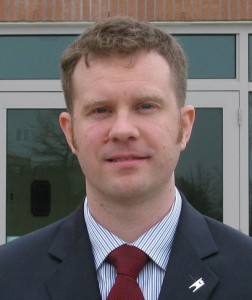When Words Matter: Would Humanists Benefit From Being More Open to Religious Language?

Jason Torpy, AHA’s board treasurer, reacts to the media calling the popular Sunday Assembly an “atheist megachurch” and asks whether there’s room for “spiritual” people in the freethought movement.
Among atheists, I lament an ‘allergy’ to certain terms. There is a concern among many that anything with ‘church’ or ‘god’ or ‘prayer’ is tainted and must be purged from culture or at least from the humanist community. This comes honestly as many have been downright traumatized personally by an oppressive religious upbringing and have a concern about the wider culture. Now this ‘allergy,’ as I like to call it, is not nearly as bad as the religious right claims it is. They like to marginalize every legitimate church-state violation as just the whining of an offended atheist. All rhetoric aside, many of us could stand some more acceptance of the terminology of religion.
Consider part of this Franciscan blessing: “May God bless us with enough foolishness to believe that we really can make a difference in this world, so that we are able, with God’s grace, to do what others claim cannot be done.”
I could “secularize” this, but what would really be the point? The religious wording adds no real value, but there is little value in stripping it out. Why not give credit? Franciscans, at least in this case, encouraged people to reach for their dreams and to seek to do what others say can’t be done. We even have the opportunity, as I did, to look up the full “blessing.” It is an inspiring encouragement of skepticism, social justice, and compassion as well as meaningful action.
Media is seizing upon “atheist church” of the Sunday Assembly. This isn’t strictly atheist, just secular good times that atheists enjoy in a larger proportion to the general population. But it is encouraging when some atheists don’t reject a fun time on Sunday morning simply because Christians also do it. Similarly, “spirituality” is a term of great contention. Many humanists freely embrace the term spirituality, while many others pick up a dictionary and point to definitions that exclusively reference ghosts, souls, and woo. The U.S. military has embraced “spirituality” in full force and is locked in a struggle against those fill this spirituality training with Christian messaging and those well-meaning and naive military leaders who think prayer is an activity atheists find comforting to perform (seriously).
While I advocate for incorporating more “religious” terminology, it is clear not all religious wording is innocuous or transferrable. It’s not so easy to overlook the changing of our national motto from E Pluribus Unum to “In God We Trust.” E Pluribus Unum means “Out of Many, One” but I don’t think a religious monolith is the noblest outcome for our society. Adding “Under God” to the Pledge of Allegiance is similarly concerning. We won World War II as “One Nation, Indivisible” and changes to the Pledge during the 1950s McCarthy era witch-hunts left us as one nation divided by god.
Just prior to Veterans Day, distinguished veteran Congressman Sam Johnson provided another example of how words matter: “Our Founding Fathers declared we are ‘One nation under God,’ and you better believe I’ll fight like mad to keep it that way,” he said. “I can tell you from experience, there are no atheists in foxholes.” The Founders had no part in the 1950s change of the Pledge, which was originally written in 1892. Congressman Johnson’s disrespect for his fellow veterans is borne of his ignorance of history and the modern diversity of our military.
He made these statements to express his outrage that the Air Force Academy honor code include “So Help Me God” as an optional, rather than required, statement. Johnson, like other “Christian Nation” evangelists, wants to enforce his god-belief on Academy cadets. Neither the Naval Academy nor my own alma mater, West Point, have any reference to a higher power. We needed no divine co-signer on our integrity. The American Humanist Association continues litigation against forced Pledge prayer in Massachusetts schools. In cases like this, words do matter and can’t simply be ignored.
Just as we humanists could benefit from more openness to religious language in certain cases, the leaders of our nation who happen to be religious must remember that they deserve no bullhorn, legal enforcement, or official encouragement for their beliefs. Their evangelism will have to stand on its own merits in churches, street corners, billboards, TV commercials, popular media, and private conversations. And we humanists will have equal opportunity to participate. Perhaps we may take that Franciscan encouragement to make change never thought possible.
